Parenta Magazine Issue 9 July
Create successful ePaper yourself
Turn your PDF publications into a flip-book with our unique Google optimized e-Paper software.
Experimenting with forces<br />
Recently I witnessed one child making a painting by tipping watery paint backwards and<br />
forwards over some card in a tray. After about half an hour she had used all the colours,<br />
got excited about all the different mixtures, exclaimed over the patterns that she was<br />
creating and even seemed pleased that her painting (which had been a riot of brilliant<br />
coloured swirls) was completely brown. She didn’t really mind what her picture looked like<br />
once it dried. As she explored the process of making her painting her interest in what she<br />
was experiencing led her to learn about how colours mix and change, how paint flows<br />
and dribbles across a sloping surface, how she could affect the flow of paint by tilting the<br />
paper more or less steeply; she explored what happens if she tipped the tray back and<br />
forth really fast, and what happens if she put all the colours on the paper at the same<br />
time. She learned a bit about gravity, she talked about what she was seeing and she kept<br />
experimenting until she felt she’d exhausted all her options and in the end she was very<br />
proud of what she’d achieved.<br />
Awareness of culture<br />
When finding motivational resources for art activities I avoid worksheets and templates to<br />
colour in and stick together, preferring to use real artworks to inspire children’s individual<br />
creativity (the above experience was inspired by the work of Holton Rower) which I hope,<br />
expands their cultural awareness. Seeing pictures of artists at work in their studios, or<br />
even visiting an artist if there are any studios nearby, demonstrates that Artist is a job, just<br />
like a Train Driver or Police Officer. It also introduces the children to culture beyond the TV<br />
programs and merchandise marketed at them, and through developmentally appropriate<br />
art activities, pre-school children can even begin to play an active role in this culture. By<br />
using a zoetrope, pre-school children can make their own animations, for example.<br />
Or they can use clay to make pots and bowls just like the ones we eat our dinner from.<br />
A trip to an art gallery can be followed up with an exhibition in your nursery or a local<br />
cafe where parents, grandparents, carers and siblings can admire the results of your<br />
pre-schoolers’ creative pursuits. In this way the early introduction to expressive arts and<br />
culture can lead to cultural empowerment.<br />
Growing in self confidence<br />
Finally, and perhaps most importantly, one of my primary objectives when facilitating<br />
pre-school art sessions is that the children who participate will grow in self confidence.<br />
Art is pretty unique in its provision of opportunities to learn new things without the fear of<br />
failure. When making art you can find it frustrating, you might even want to smash what<br />
you made (an important part of the creative process) but it can never really be wrong in<br />
the way that you can get counting wrong. When you’re experimenting with media, there’s<br />
no need to be precious about what you make. In fact, wouldn’t it be great if children could<br />
always make art in an environment that enables them to explore with abandon, allowing<br />
their individual learning styles, modes of expression and developing personalities to<br />
flourish unrestrained. With meaningful feedback, praise for their efforts and affirmation<br />
of the value of their process and products, I believe art in the early years can be a key<br />
contributor to the strengthening of every pre-school child’s self confidence and<br />
self-awareness. Because there is no such thing as failure in early years art, a child can<br />
learn that who they are, what they can do, how they express themselves and the ways<br />
that they instinctively relate to the world, are all inherently good and valuable, and will<br />
continue to be as they grow.<br />
Matthew Kay is an artist and early years art specialist with 16 years experience of delivering arts<br />
education in primary schools and nurseries. He facilitates contemporary art inspired learning<br />
experiences for nurseries and pre-schools in South West London, as Eyes Pie Arts.<br />
To find out more, visit his website here or email him.

















